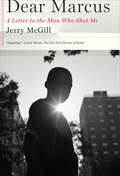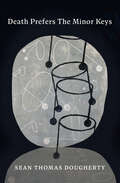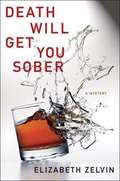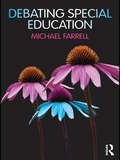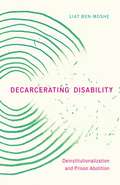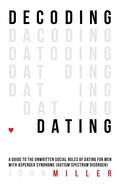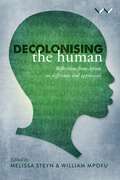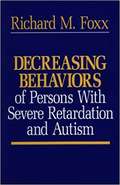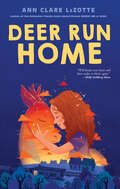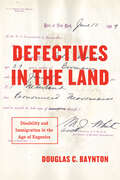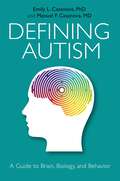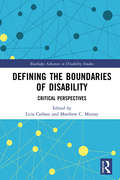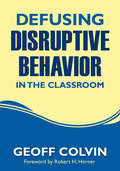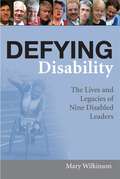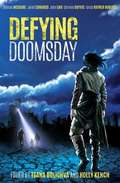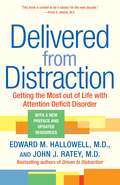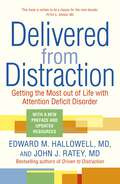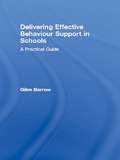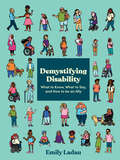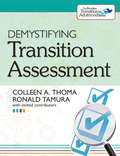- Table View
- List View
Dear Marcus: A Letter to the Man Who Shot Me
by Jerry McgillWhen Jerry McGill was growing up in the housing projects on the Lower East Side of Manhattan in the 1980s, his future seemed bright: Though times were tough for a family led by a single mother, McGill was a charming, precocious teenager, already excelling as an athlete and a dancer. But everything changed one night when he was thirteen. Walking home from a New Year's party with a friend, McGill was shot in the back by an unknown assailant, who was never caught. Soon after, he learned that he would be wheelchair-bound for life. Written as a letter to the man who shot him, whom he decides to call Marcus, Dear Marcus is a reflection on McGill's childhood, the event that changed his life in an instant, the challenges of living with a disability, and the importance of optimism, forgiveness, and making the most of our gifts. In this direct and intimate attempt to explain to his attacker the repercussions of his deeds--how one man's random decision radically altered the course of another's life--McGill takes us to the streets of New York City in the 1980s, to the hospital where he spent six months recovering, and on his journey to make the most of his new life. He recounts the joys he has experienced traveling the globe and mentoring disabled children, the love and support he has received over the years, and the strengths he has been able to find within himself that he may never have discovered had his life turned out differently. By turns brutally honest and funny, both full of rage and full of heart, Dear Marcus is an inspiring book about the moments in life that shape us--the ones that catch us by surprise, that blindside us, but that present us with opportunities for growth, reflection, compassion, and forgiveness. At some point--to greater or lesser degrees--we will all be in the wrong place at the wrong time. The challenge, though, as Dear Marcus shows us, is not to wallow in despair or blame other people, but to rise up and find strengths within ourselves that we didn't know we had.
Dear Suzie: The Sweet Love Story Between a Dog and her Beloved Human
by Grace FranchiThe story of a unique relationship between an exceptional guide dog and her human partner.
Death Knell (Duncan Maclain Mystery #5)
by Baynard KendrickWhen Troy Singleton is murdered on the Terrace of Larmar Jordan, Larmar is the prime and most obvious subject. But Duncan MacLain the famous blind detective is called in to figure out if Larmar is truly innocent. Come along on a thrilling novel from the perspective of the blind detective who can shoot at sound, and has a trained police dog Driest and a guide dog Schnucke. Can Duncan put the pieces of the puzzle together in time?
Death Prefers the Minor Keys
by Sean Thomas DoughertyIn his twentieth book, most of which was first composed on the backs of medical forms while on break as a third-shift medical technician, Sean Thomas Dougherty brings us a memoir-like prose sequence reflecting on disability, chronic illness, addiction, survival, love, and parenthood. In Death Prefers the Minor Keys, Dougherty offers the reader collaged prose poems, stories and essays full of dreams, metaphors, aphorisms, parables and narratives of his work as a caregiver. Moving portraits of Dougherty’s residents, a series of letters to Death, invocations of Jewish ancestry through the photography of Roman Vishniac, imaginary treatments for brain injuries, and half translated short stories of lives both real and imagined populate this collection. Through these, Dougherty engages issues of labor, the ontology of disability, and the mysticism of life. Death Prefers the Minor Keys is most of all a kind of love letter to Dougherty’s wife, and her courage and complicity in the face of long-term illness and addiction. Ultimately, we see how the antidote to despair can reside in daily acts of caring for other human beings.
Death Will Get You Sober
by Elizabeth ZelvinOn Christmas Day, Bruce Kohler wakes up in detox on the Bowery in New York City. He knows it's time to change his life, but how can he stay sober without dying of boredom? When homeless alcoholics start to die unexpectedly, Bruce is surprised to find he cares enough to want to find out why. Most of them had been down and out for many years, but Bruce's friend Guff was different: a cynical aristocrat with a trust fund and some secrets. Two old friends give Bruce a second chance and agree to help him with his investigation: his best friend, Jimmy, a computer genius and history buff who's been in AA for years, and Jimmy's girlfriend Barbara, a counselor who sometimes crosses the line between helping and codependency. Barbara works a night shift at the detox and confronts a counselor who might still be dealing drugs. Bruce gets a job temping for Guff's arrogant nephew. Between the three of them, suspects start piling up. The trail leads back to the detox. Or does it? In Death Will Get You Sober, Bruce discovers that the church basements of AA are a small world in the big city of New York.As he grapples with staying sober, he finds that not drinking is only the beginning of coming back to life--a life he finds he wants to keep when it's threatened by a killer. Debut author Elizabeth Zelvin has used her expertise as an addiction councilor to pen a riveting mystery filled with memorable, realistic characters who are as flawed as they are heroic.
Debating Special Education
by Michael FarrellDebating Special Education is a provocative yet timely book examining a range of criticisms made of special education in recent years. Michael Farrell analyses several key debates in special education giving balanced critical responses to inform policy and practice for the future of special education. The book identifies possible limitations to the current special education knowledge base and provision. Michael Farrell examines the value of labelling and classification, and asks if intelligence testing may have detrimental effects; and addresses a number of complex issues such as: how practitioners work within special education; and if, sometimes, professionals may be self-serving whether there is distinctive provision for different types of disabilities and disorders inclusion as mainstreaming offered as an alternative to special education, and the challenges this presents. The author's conclusion is that in responding to these challenges, special education demonstrates its continuing relevance and strength. Presenting a range of international, cross-disciplinary perspectives and debates – which are vital to an understanding of special education today, and written in Farrell's typically accessible style – this book will be relevant for teachers of special children in ordinary and special schools; those on teacher training courses and anyone whose work relates to special education.
Decarcerating Disability: Deinstitutionalization and Prison Abolition
by Liat Ben-MosheThis vital addition to carceral, prison, and disability studies draws important new links between deinstitutionalization and decarceration Prison abolition and decarceration are increasingly debated, but it is often without taking into account the largest exodus of people from carceral facilities in the twentieth century: the closure of disability institutions and psychiatric hospitals. Decarcerating Disability provides a much-needed corrective, combining a genealogy of deinstitutionalization with critiques of the current prison system.Liat Ben-Moshe provides groundbreaking case studies that show how abolition is not an unattainable goal but rather a reality, and how it plays out in different arenas of incarceration—antipsychiatry, the field of intellectual disabilities, and the fight against the prison-industrial complex. Ben-Moshe discusses a range of topics, including why deinstitutionalization is often wrongly blamed for the rise in incarceration; who resists decarceration and deinstitutionalization, and the coalitions opposing such resistance; and how understanding deinstitutionalization as a form of residential integration makes visible intersections with racial desegregation. By connecting deinstitutionalization with prison abolition, Decarcerating Disability also illuminates some of the limitations of disability rights and inclusion discourses, as well as tactics such as litigation, in securing freedom. Decarcerating Disability&’s rich analysis of lived experience, history, and culture helps to chart a way out of a failing system of incarceration.
Decoding Dating: A Guide to the Unwritten Social Rules of Dating for Men with Asperger Syndrome (Autism Spectrum Disorder)
by John MillerThe ultimate guide to cracking the social code of dating! The rules of dating are a conundrum for many men, but for men with Asperger Syndrome (Autism Spectrum Disorder) who often have difficulty understanding social communication, they can be almost indecipherable. This book methodically breaks down the steps of dating giving advice on the best places to meet women - whether on or offline, getting ready for the big date, where to go and what to talk about, and how to tell if a second date is on the cards. Written for those with little or no prior experience on the dating scene, the book discusses how to know if you are ready for a relationship, what qualities to look for in a potential girlfriend, and if dating goes well how to make a relationship work.
Decolonising the Human: Reflections from Africa on difference and oppression
by Melissa Steyn, William MpofuDecolonising the Human examines the ongoing project of constituting ‘the human’ in light of the durability of coloniality and the persistence of multiple oppressionsThe ‘human’ emerges as a deeply political category, historically constructed as a scarce existential resource. Once weaponised, it allows for the social, political and economic elevation of those who are centred within its magic circle, and the degradation, marginalisation and immiseration of those excluded as the different and inferior Other, the less than human. Speaking from Africa, a key site where the category of the human has been used throughout European modernity to control, exclude and deny equality of being, the contributors use decoloniality as a potent theoretical and philosophical tool, gesturing towards a liberated, pluriversal world where human difference will be recognised as a gift, not used to police the boundaries of the human. Here is a transdisciplinary critical exploration of a wide range of subjects, including history, politics, philosophy, sociology, anthropology and decolonial studies.
Decreasing Behaviors Of Persons With Severe Retardation And Autism
by Richard M. FoxxThis widely used manual shows how to increase desirable behaviors by using techniques such as shaping, prompting, fading, modeling, backward chaining, and graduated guidance. It offers specific guidelines for arranging and managing the learning environment as well as standards for evaluating and maintaining success. Exercises, review questions, and numerous examples are included. The book is written for special educators, aides, residential staff, and those responsible for designing or evaluating behavioral programs. Often adopted as a supplementary college text.
Deeper into the Soul: Beyond Dementia and Alzheimer's Toward Forgetfulness Care
by Bogna Szymkiewicz Nader Robert ShabahangiIn Deeper Into The Soul: Beyond Dementia and Alzheimer's Toward Forgetfulness Care, the authors invite us to shift our attitude toward dementia, or Forgetfulness, as they call it. Accompanying us are four characters -- a sage, a psychologist, a physician, and an intern -- who each see Forgetfulness from a different viewpoint. The goal is to develop a perspective which includes the basic ingredients of openness, curiosity, and acceptance.
Deer Run Home
by Ann Clare LeZotteEffie is Deaf, and no one in her family speaks sign language, her language. This moving story of survival and found family, inspired by a true court case, is perfect for fans of Wonder and Out of My Mind.* "Quietly extraordinary." -Kirkus Reviews, starred review* "Elegantly weaves a heartbreaking story with hope." -School Library Journal, starred reviewEffie and her older sister, Deja, have recently moved into their father's trailer after an incident at their mom's house. Daddy communicates with Effie by pointing, stomping on the floor, and making thoughtless jokes. Even if they did understand each other, could she tell the terrible secret she carries when telling feels impossible-and dangerous?But what if telling is the only way to be seen?This tender, spare, emotionally charged story about the impact of abuse and the power of love explores what it feels like to be an outsider in your own family and to awaken-through friendship, writing, and kinship with the natural world-to a new understanding and appreciation of yourself.
Defectives in the Land: Disability and Immigration in the Age of Eugenics
by Douglas C. BayntonImmigration history has largely focused on the restriction of immigrants by race and ethnicity, overlooking disability as a crucial factor in the crafting of the image of the "undesirable immigrant." Defectives in the Land, Douglas C. Baynton's groundbreaking new look at immigration and disability, aims to change this. In the late nineteenth and early twentieth centuries, Baynton explains, immigration restriction in the United States was primarily intended to keep people with disabilities--known as "defectives"--out of the country. The list of those included is long: the deaf, blind, epileptic, and mobility impaired; people with curved spines, hernias, flat or club feet, missing limbs, and short limbs; those unusually short or tall; people with intellectual or psychiatric disabilities; intersexuals; men of "poor physique" and men diagnosed with "feminism." Not only were disabled individuals excluded, but particular races and nationalities were also identified as undesirable based on their supposed susceptibility to mental, moral, and physical defects. In this transformative book, Baynton argues that early immigration laws were a cohesive whole--a decades-long effort to find an effective method of excluding people considered to be defective. This effort was one aspect of a national culture that was increasingly fixated on competition and efficiency, anxious about physical appearance and difference, and haunted by a fear of hereditary defect and the degeneration of the American race.
Defiant Children: A Clinician's Manual for Parent Training
by Russell A. BarkleyA sequence of procedures for training parents in child management skills that have been refined by Barkley's past 10 years of clinical work.
Defining Autism: A Guide to Brain, Biology, and Behavior
by Emily L. Casanova Manuel CasanovaOffering a summary of the current state of knowledge in autism research, Defining Autism looks at the different genetic, neurological and environmental causes of, and contributory factors to autism. It takes a wide-ranging view of developmental and genetic factors, and considers autism's relationship with other conditions such as epilepsy. Shedding light on the vast number of autism-related syndromes which are all too often denied adequate attention, it shows how, whilst autism refers to a single syndrome, it can be understood as many different conditions, with the common factors being biological, rather than behavioral.
Defining the Boundaries of Disability: Critical Perspectives (Routledge Advances in Disability Studies)
by Licia CarlsonThis ground-breaking volume considers what it means to make claims of disability membership in view of the robust Disability Rights movement, the rich areas of academic inquiry into disability, increased philosophical attention to the nature and significance of disability, a vibrant disability culture and disability arts movement, and advances in biomedical science and technology. By focusing on the statement, "We are all disabled", the book explores the following questions: What are the philosophical, political, and practical implications of making this claim? What conceptions of disability underlie it? When, if ever, is this claim justified, and when or why might it be problematic or harmful? What are the implications of claiming "we are all disabled" amidst this global COVID-19 pandemic? These critical reflections on the boundaries of disability include perspectives from the humanities, social sciences, law, and the arts. In exploring the boundaries of disability, and the ways in which these lines are drawn theoretically, legally, medically, socially, and culturally, the authors in this volume challenge particular conceptions of disability, expand the meaning and significance of the term, and consider the implications of claiming disability as an identity. It will be of interest to a broad audience, including disability scholars, advocates and activists, philosophers and historians of disability, moral theorists, clinicians, legal scholars, and artists.
Defusing Disruptive Behavior in the Classroom
by Geoffrey T. ColvinThe ultimate guide to handling problem behavior "in the heat of the moment"! When disruptive behavior occurs, your first response can determine how quickly the situation is resolved. Colvin offers teachers seven key behavioral principles and a range of research-based approaches for immediately defusing disruptive situations, avoiding escalation, and correcting behaviors. This resource features: Strategies that target specific behaviors, including off-task behavior, rule violations, disrespect, agitation, noncompliance, and threats and intimidation Common classroom scenarios and solutions for K–12 general and special education teachers Checklists and action plans for applying the strategies while maintaining the flow of instruction
Defying Disability: The Lives and Legacies of Nine Disabled Leaders
by Mary WilkinsonThis book tells the stories of nine disabled leaders who, by force of personality and concrete achievement, have made us think differently about disability. Whatever direction they have come from, they share a common will to change society so that disabled people get a fair deal. There are compelling biographies of: · Sir Bert Massie: public servant · Lord (Jack) Ashley: Labour politician · Rachel Hurst: activist and campaigner · Tom Shakespeare: academic · Phil Friend: entrepreneur and business consultant · Peter White: broadcaster · Mat Fraser: actor, musician and performer · Andrew Lee: activist and campaigner · Dame Tanni Grey-Thompson: Paralympic champion Defying Disability is based on extensive interviews with the subjects and the people who know them. It marks their similarities and differences, the forces that drove them to achieve, the impact they have had on policies and practice, and how the modern history of disability in the UK has been played out in their lives. Defying Disability is not just a good read; it will inform professionals in the field, students in disability studies, disabled people, their families and carers, and everyone interested in disability politics and policies.
Defying Doomsday
by Tsana Dolichva Holly KenchTeens form an all-girl band in the face of an impending comet. A woman faces giant spiders to collect silk and protect her family. New friends take their radio show on the road in search of plague survivors. A man seeks love in a fading world. How would you survive the apocalypse? Defying Doomsday is an anthology of apocalypse fiction featuring disabled and chronically ill protagonists, proving it’s not always the “fittest” who survive - it’s the most tenacious, stubborn, enduring and innovative characters who have the best chance of adapting when everything is lost. In stories of fear, hope and survival, this anthology gives new perspectives on the end of the world, from authors Corinne Duyvis, Janet Edwards, Seanan McGuire, Tansy Rayner Roberts, Stephanie Gunn, Elinor Caiman Sands, Rivqa Rafael, Bogi Takács, John Chu, Maree Kimberley, Octavia Cade, Lauren E Mitchell, Thoraiya Dyer, Samantha Rich, and K Evangelista.
Deliverance from Jericho: Six Years in a Blind School
by Bruce Atchison<P>Imagine being a disabled child, hastily sent to a boarding school hundreds of miles from home, and being kept there for months at a time. This was the fate of most physically and mentally impaired students half a century ago. Intellectuals and government officials once believed that the best way to educate “handicapped youngsters” was to segregate them from the able-bodied population, concentrating those pupils into large institutions. <P>Deliverance from Jericho: Six Years in a Blind School is the story of Bruce Atchison, one such child. Shuttled between a dysfunctional family and an uncaring asylum, his feelings and experiences are related here in a candid fashion. Through his partially-sighted eyes, readers are given a glimpse beyond the manicured lawns and impressive facades into the daily life of Jericho Hill School for the Deaf and Blind. <P>The author describes how he and his classmates learned Braille, used an abacus for arithmetic, and played sports, educational aspects which are not generally known to the public. Apart from those differences, school life was basically the same as in other institutes. Jericho had its bullies, its cliques, its out-of-touch administrators, and its deplorable food.
Delivered from Distraction
by Edward M. Hallowell John J. RateyIn 1994, Driven to Distraction sparked a revolution in our understanding of attention deficit disorder. Widely recognized as the classic in the field, the book has sold more than a million copies. Now a second revolution is under way in the approach to ADD, and the news is great. Drug therapies, our understanding of the role of diet and exercise, even the way we define the disorder-all are changing radically. And doctors are realizing that millions of adults suffer from this condition, though the vast majority of them remain undiagnosed and untreated. In this new book, Drs. Edward M. Hallowell and John J. Ratey build on the breakthroughs of Driven to Distraction to offer a comprehensive and entirely up-to-date guide to living a successful life with ADD. As Hallowell and Ratey point out, "attention deficit disorder" is a highly misleading description of an intriguing kind of mind. Original, charismatic, energetic, often brilliant, people with ADD have extraordinary talents and gifts embedded in their highly charged but easily distracted minds. Tailored expressly to ADD learning styles and attention spans, Delivered from Distraction provides accessible, engaging discussions of every aspect of the condition, from diagnosis to finding the proper treatment regime. Inside you'll discover* whether ADD runs in families* new diagnostic procedures, tests, and evaluations* the links between ADD and other conditions* how people with ADD can free up their inner talents and strengths* the new drugs and how they work, and why they're not for everyone* exciting advances in nonpharmaceutical therapies, including changes in diet, exercise, and lifestyle* how to adapt the classic twelve-step program to treat ADD* sexual problems associated with ADD and how to resolve them* strategies for dealing with procrastination, clutter, and chronic forgetfulness ADD is a trait, a way of living in the world. It only becomes a disorder when it impairs your life. Featuring gripping profiles of patients with ADD who have triumphed, Delivered from Distraction is a wise, loving guide to releasing the positive energy that all people with ADD hold inside. If you have ADD or care about someone who does, this is the book you must read. From the Hardcover edition.
Delivered from Distraction: Getting the Most out of Life with Attention Deficit Disorder
by Edward M. Hallowell John J. Ratey'If you read only one book about attention deficit disorder, it should be Delivered from Distraction.' Michael Thompson, Ph.D., New York Times bestselling co-author of Raising CainIn 1994, Driven to Distraction sparked a revolution in our understanding of attention deficit disorder. Widely recognized as the classic in the field, the book has sold more than a million copies. Now a second revolution is under way in the approach to ADD, and the news is great. Drug therapies, our understanding of the role of diet and exercise, even the way we define the disorder - all are changing radically. And doctors are realizing that millions of adults suffer from this condition, though the vast majority of them remain undiagnosed and untreated. In this new book, Drs Edward M. Hallowell and John J. Ratey build on the breakthroughs of Driven to Distraction to offer a comprehensive and entirely up-to-date guide to living a successful life with ADD.As Hallowell and Ratey point out, 'attention deficit disorder' is a highly misleading description of an intriguing kind of mind. Original, charismatic, energetic, often brilliant, people with ADD have extraordinary talents and gifts embedded in their highly charged but easily distracted minds. Tailored expressly to ADD learning styles and attention spans, Delivered from Distraction provides accessible, engaging discussions of every aspect of the condition, from diagnosis to finding the proper treatment regime. Inside you'll discover:- whether ADD runs in families- new diagnostic procedures, tests, and evaluations- the links between ADD and other conditions- how people with ADD can free up their inner talents and strengths- the new drugs and how they work, and why they're not for everyone- exciting advances in nonpharmaceutical therapies, including changes in diet, exercise, and lifestyle- how to adapt the classic twelve-step program to treat ADD- sexual problems associated with ADD and how to resolve them- strategies for dealing with procrastination, clutter, and chronic forgetfulnessADD is a trait, a way of living in the world. It only becomes a disorder when it impairs your life. Featuring gripping profiles of patients with ADD who have triumphed, Delivered from Distraction is a wise, loving guide to releasing the positive energy that all people with ADD hold inside. If you have ADD or care about someone who does, this is the book you must read.
Delivering Effective Behaviour Support in Schools: A Practical Guide
by Giles BarrowThis book is intended to help schools become increasingly inclusive. The advice and guidance is aimed at managers and practitioners providing behavior support, either through an LEA service, by outreach work from specialist centers or via on-site provision. You will find advice on developing effective support; planning, monitoring and evaluating support; working in partnership with colleagues in schools and other services; identifying resources to maximize behavior support interventions; and providing support staff with proven techniques for improving service delivery. There are lots of practical resources for implementing suggested strategies, examples of proformas and spreadsheet formats and other useful planning materials relating to behavior support. Managers of behavior support services should find this book particularly helpful, as will those staff providing behavior support from PRUs (Pupil Referral Units), on-site units and special schools. There will also be aspects of the book that will appeal to mentors and staff with pastoral responsibilities in mainstream schools.
Demystifying Disability: What to Know, What to Say, and How to Be an Ally
by Emily LadauAn approachable guide to being a thoughtful, informed ally to disabled people, with actionable steps for what to say and do (and what not to do) and how you can help make the world a more inclusive place ONE OF THE BEST BOOKS OF THE YEAR: NPR, Booklist • &“A candid, accessible cheat sheet for anyone who wants to thoughtfully join the conversation . . . Emily makes the intimidating approachable and the complicated clear.&”—Rebekah Taussig, author of Sitting Pretty: The View from My Ordinary, Resilient, Disabled Body People with disabilities are the world&’s largest minority, an estimated 15 percent of the global population. But many of us—disabled and nondisabled alike—don&’t know how to act, what to say, or how to be an ally to the disability community. What are the appropriate ways to think, talk, and ask about disability? Demystifying Disability is a friendly handbook on the important disability issues you need to know about, including:• Recognizing and avoiding ableism (discrimination toward disabled people)• Practicing good disability etiquette• Ensuring accessibility becomes your standard practice, from everyday communication to planning special events• Appreciating disability history and identity• Identifying and speaking up about disability stereotypes in media Authored by celebrated disability rights advocate, speaker, and writer Emily Ladau, this practical, intersectional guide offers all readers a welcoming place to understand disability as part of the human experience.Praise for Demystifying Disability&“Whether you have a disability, or you are non-disabled, Demystifying Disability is a MUST READ. Emily Ladau is a wise spirit who thinks deeply and writes exquisitely.&”—Judy Heumann, international disability rights advocate and author of Being Heumann &“Emily Ladau has done her homework, and Demystifying Disability is her candid, accessible cheat sheet for anyone who wants to thoughtfully join the conversation. A teacher who makes you forget you&’re learning, Emily makes the intimidating approachable and the complicated clear. This book is a generous and needed gift.&”—Rebekah Taussig, author of Sitting Pretty: The View from My Ordinary Resilient Disabled Body
Demystifying Transition Assessment (The Brookes Transition to Adulthood Series)
by Ronald Tamura Colleen Thoma<p>Assessment is the cornerstone of every good transition plan. Now there's a book that demystifies the what, when, why, and how of collecting transition assessment data-and using the results to help students with disabilities prepare for adulthood. <p>Developed by two respected transition authorities, this practical guide prepares education professionals to use today's best assessment tools and strategies to identify which transition approaches really work. You'll discover how to <p> <li>choose assessments appropriate for each situation and student <li>apply best assessment practices in 7 key areas (see sidebar) <li>collect the right data at the right time <li>implement evidence-based practices that meet IDEA requirements for transition assessment <li>make the most of informal assessments and formal performance-based methods tailored to each student's needs <li>translate assessment results into better, more personalized transition IEP plans</li> <p> <p>To help you find the assessment tools that best meet your needs, the book includes an invaluable quick-reference guide to more than 90 transition assessments and which areas they assess. You'll also follow case studies of a teacher and two students as they navigate the transition assessment process, and you'll get sample forms for assessing student skills and goals, enhancing transition IEPs, helping students plan for college and employment, and much more. <p>Essential for every transition specialist and educator, this book will be your trusted companion as you make sound decisions about assessment; ensure individualized, person-centered transition plans; and support students' post-school goals and dreams.</p>
